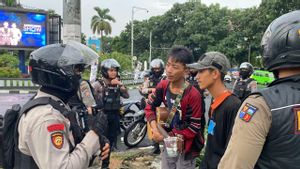JAKARTA - The government offers fiscal incentives for investors interested in building an integrated food estate project or food barn in Merauke, South Papua, after the project was designated as a Special Economic Zone (SEZ).
"If the SEZ is actually in this context more about fiscal incentives, so that later, if there are people who are interested in investing there, of course, the fiscal incentives will join the SEZ package. So later the food and energy SEZ,” said Deputy Minister of SOEs Kartika Wirjoatmodjo at the Jakarta Presidential Palace Complex, reported by Antara, Tuesday, October 10.
Tiko, as he is familiarly called, said that the Merauke food estate is also still a national strategic project (PSN).
In the future, Merauke's food estate will be managed like the Batang Industrial Estate, Central Java, which is managed by the government but involves the private sector to build a number of industries in the area.
The government in a meeting on Tuesday designated Merauke's food estate as a Special Economic Zone for rice and sugar cane production.
Tiko said it is likely that food SOEs such as PT PTPN Persero will be involved in managing the Merauke food estate.
The KEK “food estate ” Merauke land area is estimated to reach two million hectares. However, in the early stages, the construction of “food estate ” in Merauke will cover 200 thousand hectares.
President Joko Widodo previously emphasized that the construction of a food estate is not as easy as imagined, because production in the first time usually fails.
Jokowi stated that he would still build a food barn to maintain national food security.
"It's a reserve, both strategic reserves and later if it is abundant, it's okay to export it because other countries need it. So that in order to go there, if you know to build a food estate, building a food barn is not as easy as you imagine," Jokowi said on August 18, 2023.
According to Jokowi, food barns are one solution to anticipate a food crisis that threatens production, considering that regional and global countries are facing the crisis.
Indonesia this year was hit by a decline in food production due to extreme weather by El Nino. For rice commodities, the government estimates that there will be a decrease of up to 1.2 million tons from the production target of 30 million tons.
The government has stated that it will optimize food production in the next planting season to ward off the food crisis, as well as secure import quotas to ensure domestic food supply.
The English, Chinese, Japanese, Arabic, and French versions are automatically generated by the AI. So there may still be inaccuracies in translating, please always see Indonesian as our main language. (system supported by DigitalSiber.id)
Most Popular Tags
#Prabowo Subianto #golkar #Pilkada Dki #online gambling #Mount Lewotobi malePopular
24 November 2024, 03:15













